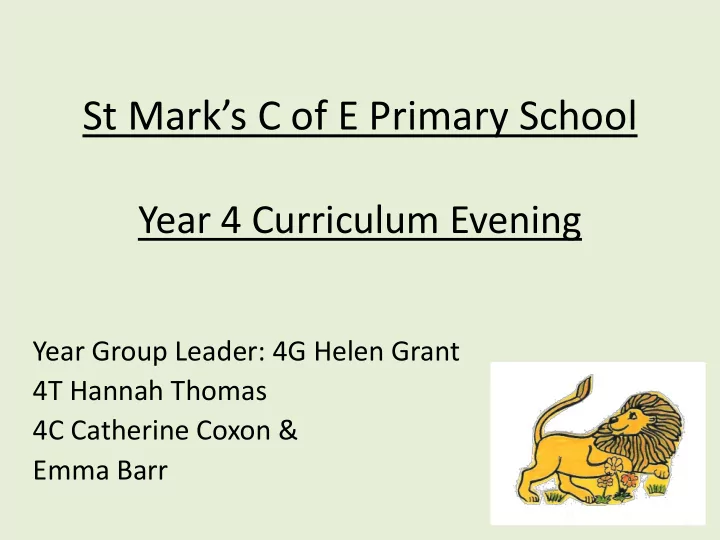

St Mark’s C of E Primary School Year 4 Curriculum Evening Year Group Leader: 4G Helen Grant 4T Hannah Thomas 4C Catherine Coxon & Emma Barr
Growth Mindsets & Talk Partners
Compliment Slips
Learning in Year 4 Encouraging behaviours for learning Independence Resilience Perseverance Reasoning Confidence Attitude
Beginning Band 1 (Y1) Working within Secure test Beginning Nation Band 2 t = SATs (Y2) Working within onal l Secure Beginning Band 3 (Y3) Working within Secure Beginning Band 4 (Y4) Working within Secure Beginning Band 5 (Y5) Working within Secure Beginning test Band 6 Nation (Y6) t = SATs Working within onal Secure l
Topic Overview of the Year • Autumn 1 – Born and Bread • Autumn 2 – Walk Like an Egyptian • Spring 1 – How to Move a Mountain • Spring 2 – It’s Showtime • Summer 1 – Book Study- The Boy Who Swam with Piranhas • Summer 2 – Rotten Romans in Britain
What will my child be learning in year 4? • Number is the key focus- place value, addition and subtraction up to 4 digit numbers • Multiplication and division facts • Problem solving & word problems • Fractions & decimals • Shapes & angles • Converting measures • Statistics- drawing and interpreting different types of data
The four operation methods used in year 4
By the end of Year 4 the national curriculum expectation is that all children should know the times tables up to 12X12 and all corresponding division facts
• Morning maths challenges • Problem solving • Mental maths • Topic links • Times table sessions
How can you help at home? • Practise times tables and division facts • Focus on key number skills such as quick addition and subtraction • Use mymaths at home • Play maths games • Keep your children involved in the every day maths you use at home e.g. cooking, telling the time, using money • Talk to us!
Reading • Comprehension skill the main focus • Using more inference skills • Using dictionaries to clarify meaning • Reading a range of texts: fact, stories, poetry, plays and reference • Reading aloud confidently, both books and their own work
Writing • Plan, write and use their skills to improve • Organise writing into structured paragraphs • Write stories which include detailed settings, clear plot and interesting characters • Write non-fiction in an organised way • Use speech punctuation accurately • Edit the spelling, grammar and punctuation used • Edit their language choices
Spelling, Punctuation and Grammar • Spelling of high frequency words • Spelling homophones correctly e.g. accept/except • Prefixes and suffixes- word beginnings and endings e.g. superstar magician • Expanded noun phrases • Adverbial phrases • Using apostrophe for omissions (don’t), possession (dog’s lead) and plural possession (teachers’ biscuits) • Different types of sentences
Spelling
Handwriting • Handwriting and presentation- cursive, fluent and neat, working towards using a handwriting pen
Handwriting
• Weekly big write sessions • Book club • Links to topic • Spelling & Grammar sessions • Focused handwriting sessions • Daily spellings and weekly spelling tests
How can you help at home? • Reading everyday- a variety of skills to focus on reading aloud with expression, pace and focus on comprehension skills • Practise spellings • Using Bug Club • Handwriting practice - ensure children are holding their pencil correctly and using the correct letter formation • Writing for pleasure- diary writing, recounts, stories, book reviews • Library visits and educational trips
Autumn 1 – Electricity Autumn 2 – States of Matter Spring 1 and 2 – Sound Summer 1 – Animals including humans- Teeth and the Digestive System Summer 2 – Living things & Habitats
Working scientifically As well as building up a bank of knowledge through the curriculum topics children will be taught to develop their scientific skills, these include • Pattern seeking • Observing • Identifying, classifying & grouping • Investigating fairly
Year 4 children: • Are expected to read regularly and record this in their Home Learning Logs (including Bug Club) • Weekly maths homework handed out on a Friday, to be completed by the following Wednesday (in addition to mymaths) • Topic homework every half-term
Home Learning Logs • Children or adult to write when they have read at home • Must be brought into school each day • Sign at the end of each week • Use to communicate with us
Please Remember…. Every day PE Home Learning Hairbands for long hair Logs Earrings Reading books PE bags in school Monday- Water bottle Friday Coat Also… Names in all items of clothing No jewellery except stud earrings and wrist watches School book bags or book bag sized bags
We want to hear from you too… Please encourage children to celebrate their achievements outside school by bringing in certificates, photographs, trophies and medals to share with us at school.
Please feel free to visit your child’s classroom, meet the class teacher and look at some of the resources the children will be using this year.
Recommend
More recommend